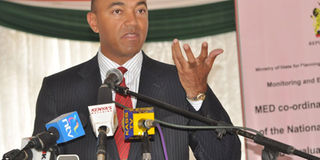Rising national debt will burden Kenyans, says Kenneth

Former presidential candidate Peter Kenneth during the launch of the 3rd Annual Progress Report on Vision 2030 in 2012 at KICC Nairobi. Mr Kenneth has cautioned that Kenyans risk being burdened by the rising national debt if it is not handled prudently. PHOTO/FILE
What you need to know:
- Kenya’s total national debt is now hovering at around 50 per cent of the GDP.
- Mr Kenneth said Kenyans should be vigilant on the utilization of borrowed funds so that they can serve the intended purpose.
- It is, however, the pace at which the country is accumulating the debt that is worrying analysts.
- The cumulative interest and other charges on domestic debt rose to Sh101.7 billion by May 2013, compared to Sh74.2 billion over a similar period in 2012.
Former presidential candidate Peter Kenneth has decried the rising public debt saying it would burden Kenyans if not handled well.
Mr Kenneth, a former Planning and National Development assistant minister recalled that at the start of 2008, Kenya's national debt stood at Sh700 billion.
“But just six years later the debt is about Sh2 trillion and from the look of things, it will hit Sh2.5 trillion by the end of the financial year,” says Mr Kenneth.
“Therefore, while our national debt has more than tripled in the last six years, the economy has lagged behind,” Mr Kenneth said in a statement via email to Nation.co.ke.
As a result, he added, Kenya’s total national debt is now hovering at around 50 per cent of the GDP.
“This is unsustainable as about 40 per cent of our revenues will go towards servicing debts and interests leaving no funds for development,” he adds.
During the campaigns for the last general election, Mr Kenneth had cautioned about the rising national debt saying the issue required serious attention.
“In recent days, the issue has gained some traction due to a significant rise in the debt though it still hasn't attained prominence in our national conversations,” Mr Kenneth said.
USE PRUDENTLY
However, Mr Kenneth noted that the acquisition of national debt is not in itself a problem, adding that the challenge lies in how the money is used.
He said money borrowed should be used prudently in projects that have the capacity to generate funds to meet annual repayments of both the principal amount and the interest.
"It seems that a big chunk of our debt goes to finance the rising recurrent expenditure especially administrative costs.
This deprives the economy of the growth momentum we need as a country to attain a middle-income status,” Mr Kenneth said.
In the past, Kenyans have been overburdened by debts that were acquired for services that were not delivered.
Mr Kenneth said Kenyans should be vigilant on the utilisation of borrowed funds so that they can serve the intended purposes.
HFTY PERKS
He said the National Assembly should also not be allowed to set remuneration packages that will hurt Kenyans in the long-run.
He cited the hefty retirement perks that are being proposed for state officers.
“A heavy and increasing wage bill and extravagant retirement benefits for top state officers will continue to threaten our economic prospects,” Mr Kenneth said.
During President Uhuru Kenyatta’s visit to China recently, the Asian country committed to offer Kenya Sh425 billion loan.
This will push the country’s total debt level past Sh2 trillion, with analysts warning of challenges in servicing the debt.
Total public debt, which stood at Sh1.9 trillion as at the end of May this year, has now soared to Sh2.3 trillion, the highest in Kenya’s history.
The amount has also pushed the foreign debt past the Sh1 trillion mark and made China the top bilateral and single largest lender to Kenya, displacing Japan.
DEBT ACCUMULATION PACE
It is, however, the pace at which the country is accumulating the debt that is worrying analysts.
As of May this year, total external debt stood at Sh832.2 billion.
“Infrastructure development ultimately provides support to the economy in the long term and the Chinese financial inflow is certainly a boost to overall development.
We are, however, likely to have serious challenges in servicing the debts,” University of Nairobi economics lecturer Dr Samuel Nyandemo told the Nation.co.ke.
The country’s total debt was already past the 50 per cent of the GDP, at 52 per cent, by May 2013, a level experts say the country should start geting concerned about its sustainability.
The government already faces a huge challenge in financing domestic debt that currently stands at more than Sh1 trillion.
The cumulative interest and other charges on domestic debt rose to Sh101.7 billion by May 2013, compared to Sh74.2 billion over a similar period in 2012.




